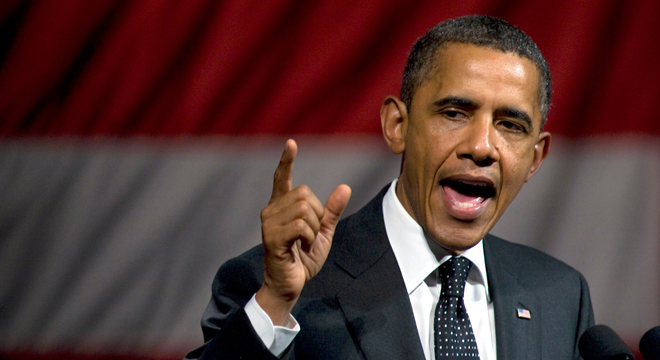Getting the federal government “out of peoples’ lives” has been a Republican talking point for decades. Of course, that attack works optimally when the person in charge is a Democrat.
New data from Gallup looks at perceptions of government intervention within the lives of individuals and business, and yes, the number of people who think the federal government is too involved is high. But the remarkable bit about the survey is just how high, and how that perception is related to political circumstance as well. The numbers show that the day President Obama took his seat in the Oval Office, the percentage of Republicans who thought the government was too powerful climbed, and kept climbing through 2009 and 2010. At the same time, Democrats, who had thought the same about the federal government when President George W. Bush was in office (although not as much as Republicans do now), also did an about-face, with far fewer saying the new Obama Administration had too much power.
But the partisan flip was to be expected. Just how much perceptions flipped was notable.
At the most divergent point of President George W. Bush’s term, near the middle of 2006, 57 percent of Democrats felt the government had too much power, versus 40 percent of Republicans. That changed dramatically during the middle of 2009, in the midst of the health care reform battle. All of a sudden, 78 percent of Republicans thought the federal government was too influential, and Dems swung down to 25 percent. That trend, nearly four-fifths of Republicans thinking that the federal government under Obama has too much power, has continued ever since.
In an interview with TPM, Gallup Editor-in-chief Frank Newport couldn’t say if that particular trend had manifested itself after other presidential transitions. But Newport said that a similar trend appeared when it comes to voters’ outlook on the economy: when a new president comes into office, voters from their party immediately become more optimistic about the country’s financial health. So there is precedent for a shift in how voters view our governing and economic systems when the politics change, and this one has been stark.
Newport said that GOP voters’ perception of the Obama administration has been increasingly tied to the use of government as a tool — “The focus on the health care plan and the perception on the part of Republicans that the administration uses government to solve these problems,” he said — which they view in a negative light. Frankly, the GOP says as much, and it’s coloring the politics of 2012.
Whatever issue a voter looks at this cycle, whether its a plan to create jobs through tax credits and infrastructure investments or the health care reform bill or legislation to reform Wall Street, it boils down to a choice between doing less or more within the scope of government. Indeed, when it comes to the most important issue on voters’ minds — growing the economy and creating jobs — the debate has mainly been between Democrats who propose plans and Republicans who argue that less government is necessary in order to stimulate growth. And Gallup found that Republicans are essentially winning that argument:
Half of Americans say there is too much government regulation of business and industry, by one percentage point the highest in Gallup’s history of asking this question, dating to 1993. Americans were least likely to say the government regulated business too much in February 2002, just months after 9/11 and at a time when President Bush and Congress were involved in efforts to combat terrorism and had high approval ratings. The “too much regulation” attitude held in the 30% range for most of the rest of the last decade, but jumped after President Obama took office in 2009.
Whatever action that comes out of Congress over the next few months, whether on jobs or debt, Newport said that the fundamental question of what we expect from the state will drive the presidential contest. “It’s a defining issue for the upcoming 2012 election, what the role of the federal government will be,” he said.









